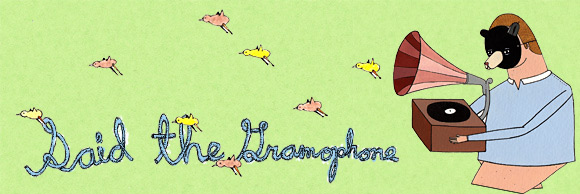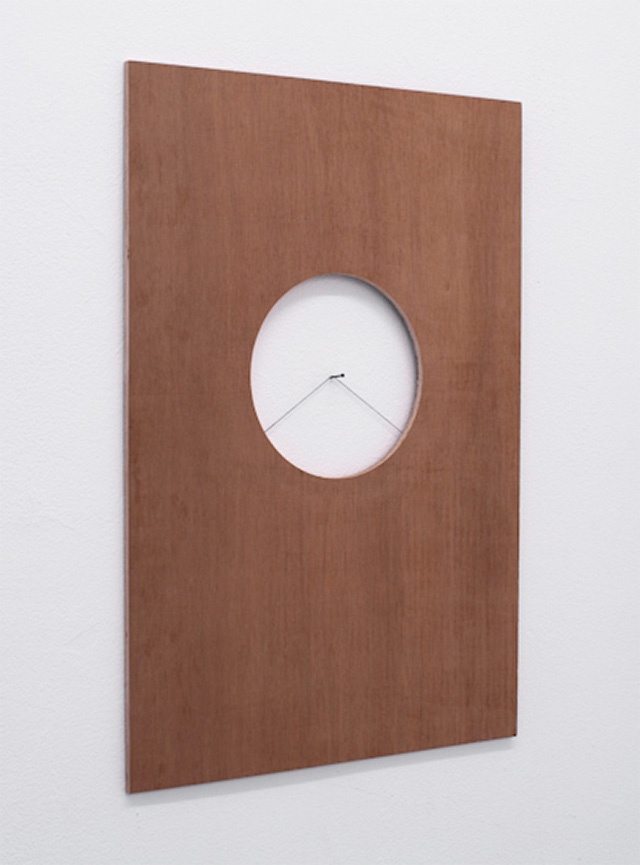
  Jeremih - "Another Song" Jeremih - "Another Song".
Take a knee, Rod, said the Champ. Do you want to be a pro, one day?
Yessir, said Rod.
Well listen, Rod. It takes more than dreams to be a pro. It takes more than practice and hard work. It takes discipline, Rod. It takes a strict regime.
A regime?
You gotta eat right, Rod. You gotta eat right. Ever seen one of these before?
No.
This is a jukebox, explained the Champ. It plays records.
Oh.
I eat one of these every day, Rod. Every single morning, with my cereal and juice.
Raw?
Yep, I eat it just like that.
  Charli XCX - "Nuclear Seasons" Charli XCX - "Nuclear Seasons".
I wish Lady Gaga's music sounded like this. I wish she was at once a 9-year-old girl and a 95-year-old crone, a liliputian and a giant, a ten-mile glacier and a kitschy grass skirt. I wish you could make a synthesiser by gathering the right gemstones, that microphones could be read like books, that angst was something you could fold, like origami, to look like different dipping birds. [website]
(photograph is of FRAMED by Anton Burdakov - source)
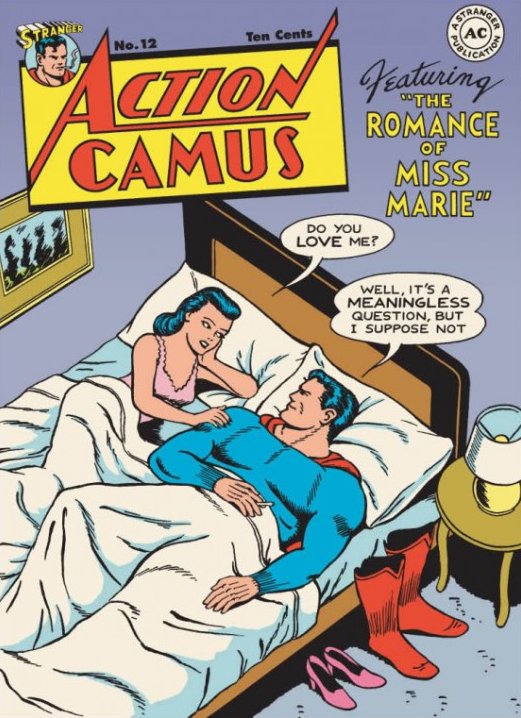
  Adanowsky - "J'aime tes genoux" Adanowsky - "J'aime tes genoux". This is a song about loving a girl's knees. Which, as a sentiment, is fair enough. I've certainly seen some nice knees, over the years. Although originally written by Henri Salvador, this cover by Adanowsky, the son of filmmaker Alejandro Jodorowsky, is offered in much the same spirit. Which prompts me to wonder: Do Salvador and Adanowsky love the same kind of knees? Knees come in different varieties. Some are sturdier than others, or more flexible. Some are wide and some narrow, some smooth and others pronounced. This song feels so indiscriminate in its affections, full of groove, strum, honk, but Jodorowsky and Salvador are very precise. I don't give a fuck about the rest of you, they sing. Your knees, they sing, to one woman in particular, J'aime, j'aime, j'aime.. They are harder to please than others, more judgmental. They are not carefree lovers; they are fascists. And they are catchy as they do it. [ buy]
  Find the Others - "In Time" Find the Others - "In Time". In 2002, two years before he knew better, he fell in love with a girl who could fit into the palm of his hand. She was made of sugar dust and gleams. She would speak to him of distant forests, faraway valleys, places where they could roam among the flowers for days. She spoke to him of the honey-cake she would bake one day. She had perfect teeth and danced like a breeze. She didn't know how to drive. He described their relationship as you would describe a miniature ship, perfect, tucked inside a bottle. This was in 2002, two years before he knew better, when he thought that the only precious things were things you couldn't drop. [ website/ buy]
(image source)
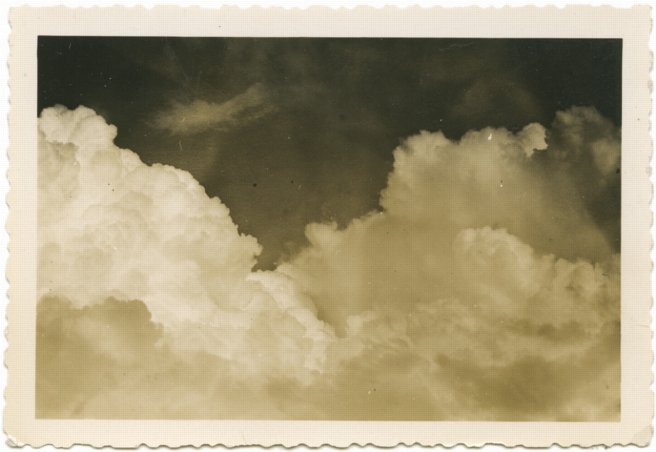
  A Tribe Called Quest - "Can I Kick It" A Tribe Called Quest - "Can I Kick It". [ buy]
"But they can't do this," shrieked Lou Reed. "It's my song! They're just taking my song?"
"Are they really, Lou?" said the Buddha.
"Yes! Listen to it! It's 'Walk on the Wild Side.' It's just 'Walk on the Wild Side.'"
"Only here and there," replied the Buddha.
"What?"
"It's only 'Walk on the Wild Side' here and there. The sample isn't used everywhere."
"But at the beginning and the end," Lou Reed said, "it fills up everything and--"
"It's not even 'Walk on the Wild Side,'" the Buddha went on. "It's the bassline. Did you play the bassline?"
"Herbie played the bassline."
"So it's like Herbie's playing on this song."
"But he's not! He didn't! He played on my song! Why-- Why are you putting it on again?"
"Listen Lou," said the Buddha. "Just listen."
And they listened for a while.
"Do you hear?"
"Hear what?"
"'Can I kick it?'"
Lou said nothing.
"'Can I kick it?'" the Buddha said again. The silence stretched on.
"Yes you can," Lou said finally.
"Exactly," said the Buddha. "Exactly." There was a long pause. "You can. It is not even a question, really. It is a question with an automatic response. 'Can I kick it?' 'Yes you can.'"
"So?" Lou mumbled.
"So this is life, Lou. Live it in the present, in the instant. Hear it, say yes, accept. 'Can I kick it?' 'Yes you can.' Stop trying to interject yourself between the question and the answer."
"What does this have to do with sampling?"
The Buddha stared at Lou. He stared at him with a grim stare, the stare he used when his blue children were misbehaving. Then the Buddha licked his lips. He began to dance. He answered Lou Reed with softshoe, one-step, two-step, three, soundless on the carpet.
(photo source)
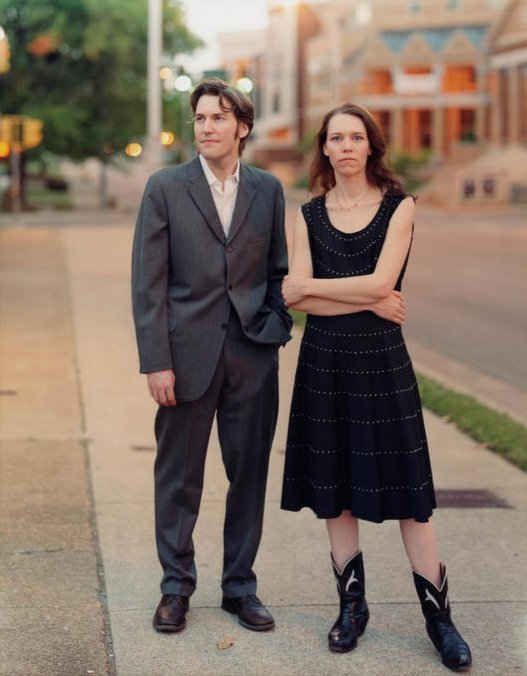
  Gillian Welch - "Look at Miss Ohio" [buy Gillian Welch - "Look at Miss Ohio" [buy]
  Gillian Welch - "Revelator" Gillian Welch - "Revelator"
  John Hartford - "In Tall Buildings" [buy John Hartford - "In Tall Buildings" [buy]
Gillian Welch at Montreal's Le National, Tuesday October 25.
Gillian Welch came on stage a little after 8:30 pm. She wore cowboy boots and a skinny dress. Beside her, Dave Rawlings, in cowboy boots and a skinny suit. He held a little acoustic guitar. He wore a hat. Gillian Welch was carrying a guitar as well, a regular one, and each of them stood behind a microphone and then they played one of the best concerts I have ever seen.
A concert can be miraculous in several different ways. It can be about the moment, the particular-place-and-time, the way everyone rallies together during a blackout; it can be because something is happening in the interior of the musician on stage, a private stirring; it can be the hometown comeback or the faraway debut. This concert was a faraway debut - Welch's first time in Montreal - but the show was not miraculous because of this. It was not miraculous because any of these things. Its miraculous-ness, its miracle, came from somewhere else.
Welch and Rawlings sang and played guitar. There was a little banjo, a little harmonica, two perfect minutes when Welch clogged to the side of the stage. That was all. No opener, two sets, three encores. 22 songs, but who's counting. You cannot imagine the warmth, the fragility, the tenderness of these two voices in harmony, united before you, wrote Le Devoir's Sylvain Cormier. No record can give this.
The miracle was this: wonderful songs, beautifully played. Musicians who have that trick of putting soul and want and ragged years into hands, voice, glint of eye. Showmen who raise the house slowly and then bring it down; who show us one treasure and then turn and show us another. They made it seem so simple. Most songs began the same way: turning to one-another, humming and strumming a bar off-mike, then there before us, songing. Welch strummed her guitar, picked her banjo; Rawlings' fingerpicking was filigree, until it wasn't, these decorations suddenly at the centre of the room. On most songs he had a solo, and these solos were whatever he wanted them to be. Short stories, meditations, blues; on "Revelator", the notes he played made the hair stand up on my arms, made my heart shake, heavy as anything I have ever heard, as Godspeed & Low & Neil Young with Crazyhorse, on that little acoustic guitar.
They would sing together, Welch's voice at the front, Rawlings in the edges, like smoke. Cormier is right: this sounds different live than on record. In recordings, Rawlings's singing seems somehow like shading, bolstering, a pretty support. In concert, they seem like one thing. Like the two colours of a mirror.
They played "One More Dollar", clear-eyed, "Red Clay Halo", jubilant, "Rock of Ages", grim and certain, "The Way It Will Be", slow and sad. They played June and Johnny Cash's "Jackson" and a gorgeous cover of John Hartford's "In Tall Buildings". They sang "Look at Miss Ohio" and we all sang along, full throated, without being asked for a thing.
They played so well. That was all they did. So well, they played.
Sometimes a miracle can fit in a small box, a box the size of a dictionary, where you keep your picks and capos.
(Two days later, Welch came down with laryngitis! Get well soon.)
---
Elsewhere:
Montreal's CKUT Radio needs your help. 90.3FM is the city's best station, based at McGill but meant for all of us. They play wonderful music and thoughtful conversations, promote community events and activism, and they'll teach anyone how to be a part of radio. It's a tremendous resource and a sort of faraway friend. If you can afford to, please, please, please donate. There are even patron give-aways: beautiful t-shirts, shoulder bags, coffee, vodka, train tickets, and tickets to Black Star or Suoni Per Il Popolo. Do it.
(photo by Mark Seliger)
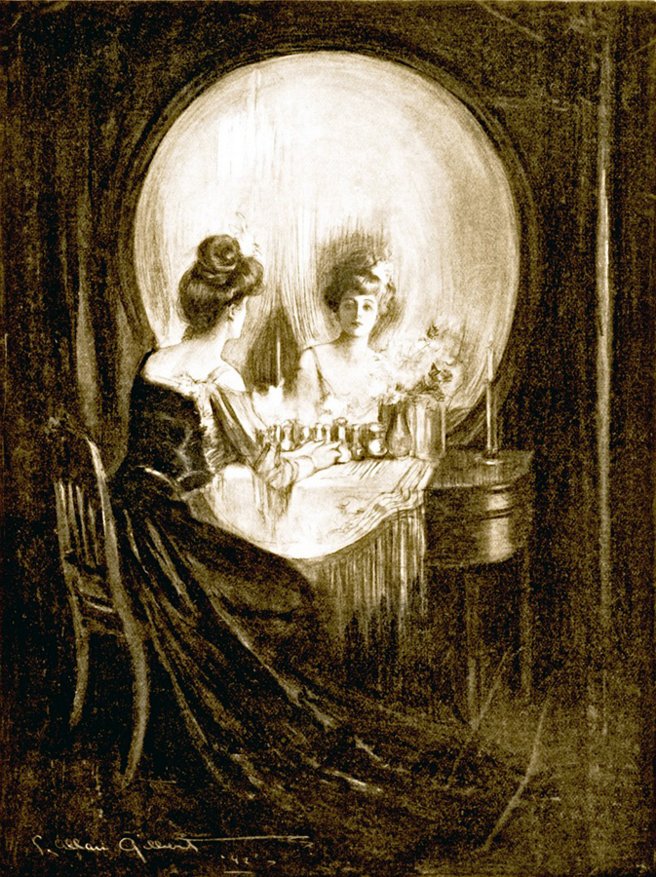
  Grimes - "Oblivion" Grimes - "Oblivion". She 1 stares into the stars, night after night, with grim concentration, and nothing changes. It is more than frustrating - it is incendiary, infuriating. She is gifted, witchy, hexed. She is more than these pinpricks. She is the dreaming changer. Her movements leave trails of light. [ Visions is due Jan 31 / buy other things]
  Bonnie "Prince" Billy - "We Are Unhappy" Bonnie "Prince" Billy - "We Are Unhappy". She 2 needed new rain boots, so she took the bus to the hardware store. It was so cold that day. Even the asphalt seemed tensed, seized-up. She walked in silence. Tiny pinwheeling white specks, not snow, maybe dust, maybe ash, maybe mid-autumn pollen. At the entrance, the doors opened without touching. Wide bright aisles. Copper pipes, pine planks, rows of sturdy shovels. She, with the end of a smile. A lie of an end of a smile. She found the boots. She took a pair in her size. She sat on a bench with the boots before her and knew she wouldn't try them on, boots in a hardware store. They'd be fine. Why bother. She looked up to where a man was cutting a key, this careful drilling sound. He was patient with the item and the tool. And she was so weary. She had thought once that by going wearily into life, everything would eventually become okay, like an ice-cube melting into water. Like resting your head on a pillow. But now her branches had been bare for so long, and it was so cold outside. And when the man was finished with the key he would give it to someone to buy. [ buy]
(image by Charles Allan Gilbert)
12:20 AM on Oct 24, 2011.

  Travels - "Lucky" Travels - "Lucky". In a building in the suburbs there is a machine that generates wisdom. It is a large machine, as big as two garages. One day, its caretakers assure visitors, such machines will be small enough to fit in our pockets. The machine's operation is simple: give it data (pdf format only), and wait. The data can be anything - random weather stats, holiday emails, photographs of family-members. The machine will make sense of this information. It will take what you have told it and respond with wisdom. Sometimes this wisdom is glib, like this is a two-garage fortune cookie: Trust your own experiences, it says. Or, True love isn't hard work. Other times the machine spits out reams and reams of pages, wisdom rendered as philosophical treatise. Sometimes it offers the video of a baby eating a watermelon from the inside out. The caretakers are still arguing over whether this was a bug.
Travels' song, "Lucky", is the response of a machine to the matter of a dead dog. Lucky died. He was a good dog. The wisdom generator has rendered its opinion in oooooohs, mantras, flea-bitten guitar. It is funny, short-haired, wagging. It chases its own tail & then stops. It is a wooded thicket and bright blue sky. It has listened to Yo La Tengo and the Fall. It will bark the bracelets onto your wrists.
[this song comes with Travels' new 7"; just $7, it comes with a 7"x7" varnished still from Travels' upcoming animated film. There are only 150 copies.]
  Ólöf Arnalds - "Close My Eyes" Ólöf Arnalds - "Close My Eyes". Iceland's Arnalds delivers a very un-icy version of Arthur Russell's "Close My Eyes". Despite her nordic vowel-sounds, it has much more to do with Sandy Denny or Anne Briggs than with Nico. It's one of those songs that seems of two seasons at once - the sun-skimmed summer, the clear-skied fall. Covers are so often redundant; it is strange & gratifying to hear a verison of "Close My Eyes" that is similar to the original but newly beautiful. This is not a deconstruction, a dance-pop inversion. It's voice and acoustic guitar. Arnalds singing those slightly different shades of rose and blue.
[buy other albums / Ólöf Sings is out Nov 8 / or buy this song on 7"]
---
Go see these gigs in Montreal: - Tonight: artful, sparkling rock'n'roll by Baby Eagle and the Proud Mothers. (Panda Bar)
- Tuesday, Oct 25: the inimitable Gillian Welch, though I believe this is sold out. (Le National)
- Thursday, Oct 27: very excited for the return of Blue Hawaii, long-quiet as they recorded and um Braids got famous. They are playing with (yes indeed) Braids and the young guitar sputniks in Parlovr. (Cabaret Mile End)
- Sunday, Oct 30: Eerie and bottomless folk music by James Irwin & Old Believer. (Casa del Popolo)
- Monday, Oct 31, Halloween: A Winged Victory for the Sullen, a ghostly side-project of Stars of the Lid. (Casa del Popolo)
(photograph is from this year's Louisiana floods, I believe)
11:23 AM on Oct 20, 2011.

  Bernard Kabanda - "Nanankya" Bernard Kabanda - "Nanankya". When someone tells you a story you do not understand, you are free to interpret it however you please. Understand it as the tale of two lovers, intersecting. As the story of the fox who met the sea. As a sage of wry rebels and their sundance kid. With a song like "Nanankya", it is not just the subject-matter you can adapt, imagine (and, admittedly, appropriate): it is the message. Make this song as wise or as inane as you please. Make it matter, or don't. Do what you will with the moment at 4:31 when the whole room bursts into applause. [Uganda's Bernard Kabanda released this song in 1999.]
  TEEN - "Just Another" TEEN - "Just Another". Iris pulls another lemon from the tree and tosses it over the wall. She has been doing this forever. It is a wonder there are any lemons left on the tree. On the other side of the wall, Iris knows, a boat is waiting in the water. Iris wonders whether it is full of lemons or whether it has sunk. [ bandcamp]
(photograph courtesy of Michael P)
11:40 AM on Oct 17, 2011.
|
about said the gramophone
This is a daily sampler of really good songs. All tracks are posted out of love. Please go out and buy the records.
To hear a song in your browser, click the  and it will begin playing. All songs are also available to download: just right-click the link and choose 'Save as...'
All songs are removed within a few weeks of posting.
Said the Gramophone launched in March 2003, and added songs in November of that year. It was one of the world's first mp3blogs.
If you would like to say hello, find out our mailing addresses or invite us to shows, please get in touch:
Montreal, Canada: Sean
Toronto, Canada: Emma
Montreal, Canada: Jeff
Montreal, Canada: Mitz
Please don't send us emails with tons of huge attachments; if emailing a bunch of mp3s etc, send us a link to download them. We are not interested in streaming widgets like soundcloud: Said the Gramophone posts are always accompanied by MP3s.
If you are the copyright holder of any song posted here, please contact us if you would like the song taken down early. Please do not direct link to any of these tracks. Please love and wonder.
"And I shall watch the ferry-boats / and they'll get high on a bluer ocean / against tomorrow's sky / and I will never grow so old again."
about the authors
Sean Michaels is the founder of Said the Gramophone. He is a writer, critic and author of the theremin novel Us Conductors. Follow him on Twitter or reach him by email here. Click here to browse his posts.
Emma Healey writes poems and essays in Toronto. She joined Said the Gramophone in 2015. This is her website and email her here.
Jeff Miller is a Montreal-based writer and zinemaker. He is the author of Ghost Pine: All Stories True and a bunch of other stories. He joined Said the Gramophone in 2015. Say hello on Twitter or email.
Mitz Takahashi is originally from Osaka, Japan who now lives and works as a furniture designer/maker in Montreal. English is not his first language so please forgive his glamour grammar mistakes. He is trying. He joined Said the Gramophone in 2015. Reach him by email here.
Site design and header typography by Neale McDavitt-Van Fleet. The header graphic is randomized: this one is by Matthew Feyld.
PAST AUTHORS
Dan Beirne wrote regularly for Said the Gramophone from August 2004 to December 2014. He is an actor and writer living in Toronto. Any claim he makes about his life on here is probably untrue. Click here to browse his posts. Email him here.
Jordan Himelfarb wrote for Said the Gramophone from November 2004 to March 2012. He lives in Toronto. He is an opinion editor at the Toronto Star. Click here to browse his posts. Email him here.
our patrons
search
Archives
elsewhere
our favourite blogs
(◊ means they write about music)
Back to the World
La Blogothèque ◊
Weird Canada ◊
Destination: Out ◊
Endless Banquet
A Grammar (Nitsuh Abebe) ◊
Ill Doctrine ◊
A London Salmagundi
Dau.pe ◊
Words and Music ◊
Petites planètes ◊
Gorilla vs Bear ◊
Herohill ◊
Silent Shout ◊
Clouds of Evil ◊
The Dolby Apposition ◊
Awesome Tapes from Africa ◊
Molars ◊
Daytrotter ◊
Matana Roberts ◊
Pitchfork Reviews Reviews ◊
i like you [podcast]
Musicophilia ◊
Anagramatron
Nicola Meighan ◊
Fluxblog ◊
radiolab [podcast]
CKUT Music ◊
plethoric pundrigrions
Wattled Smoky Honeyeater ◊
The Clear-Minded Creative
Torture Garden ◊
LPWTF? ◊
Passion of the Weiss ◊
Juan and Only ◊
Horses Think
White Hotel
Then Play Long (Marcello Carlin) ◊
Uno Moralez
Coming Up For Air (Matt Forsythe)
ftrain
my love for you is a stampede of horses
It's Nice That
Marathonpacks ◊
Song, by Toad ◊
In FocusAMASS BLOG
Inventory
Waxy
WTF [podcast]
Masalacism ◊
The Rest is Noise (Alex Ross) ◊
Goldkicks ◊
My Daguerreotype Boyfriend
The Hood Internet ◊
things we like in Montreal
eat:
st-viateur bagel
café olimpico
Euro-Deli Batory
le pick up
lawrence
kem coba
le couteau
au pied de cochon
mamie clafoutis
tourtière australienne
chez boris
ripples
alati caserta
vices & versa
+ paltoquet, cocoa locale, idée fixe, patati patata, the sparrow, pho tay ho, qin hua dumplings, café italia, hung phat banh mi, caffé san simeon, meu-meu, pho lien, romodos, patisserie guillaume, patisserie rhubarbe, kazu, lallouz, maison du nord, cuisine szechuan &c
shop:
phonopolis
drawn + quarterly
+ bottines &c
shows:
casa + sala + the hotel
blue skies turn black
montreal improv theatre
passovah productions
le cagibi
cinema du parc
pop pmontreal
yoga teacher Thea Metcalfe
(maga)zines
Cult Montreal
The Believer
The Morning News
McSweeney's
State
The Skinny
community
ILX
|

 Jeremih - "Another Song".
Jeremih - "Another Song".
 Charli XCX - "Nuclear Seasons".
Charli XCX - "Nuclear Seasons".
